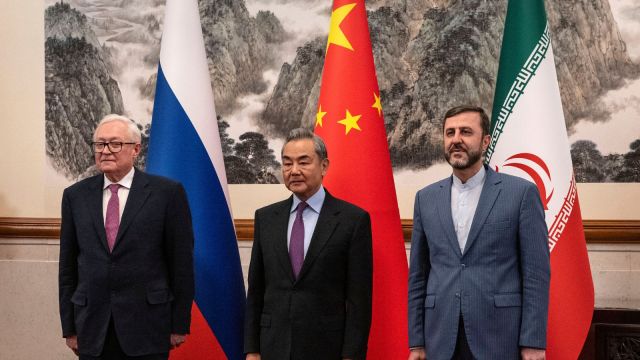Stay updated with the latest - Click here to follow us on Instagram
China, Russia, Iran call for end to US sanctions on Iran, restart nuclear talks
China, Russia and Iran “emphasized the necessity of terminating all unlawful unilateral sanctions”, China's Vice Foreign Minister Ma Zhaoxu read from a joint statement, flanked by Russia's Deputy Foreign Minister Ryabkov Sergey Alexeevich and Iran's Deputy Foreign Minister Kazem Gharibabadi.
 Chinese Foreign Minister Wag Yi, stands with Russian Deputy Foreign Minister Sergey Ryabkov, left, and Iranian Deputy Foreign Minister Kazeem Gharibabadi, right, before a meeting regarding the Iranian nuclear issue at Diaoyutai State Guest House on March 14, 2025 in Beijing, China. (Pool Photo via AP)
Chinese Foreign Minister Wag Yi, stands with Russian Deputy Foreign Minister Sergey Ryabkov, left, and Iranian Deputy Foreign Minister Kazeem Gharibabadi, right, before a meeting regarding the Iranian nuclear issue at Diaoyutai State Guest House on March 14, 2025 in Beijing, China. (Pool Photo via AP)
Representatives of China, Russia and Iran called on Friday for an end to US sanctions on Iran over its rapidly advancing nuclear programme and a restart to multinational talks on the issue.
The three countries’ meeting was the latest attempt to broach the matter and come after US President Donald Trump wrote to Iran’s supreme leader in an attempt to jumpstart talks.
The letter, which hasn’t been published, was offered as Trump levied new sanctions on Iran as part of his “maximum pressure” campaign that holds out the possibility of military action while emphasizing he still believed a new deal could be reached.
China, Russia and Iran “emphasized the necessity of terminating all unlawful unilateral sanctions”, China’s Vice Foreign Minister Ma Zhaoxu read from a joint statement, flanked by Russia’s Deputy Foreign Minister Ryabkov Sergey Alexeevich and Iran’s Deputy Foreign Minister Kazem Gharibabadi.
“The three countries reiterated that political and diplomatic engagement and dialogue based on the principle of mutual respect remains the only viable and practical option in this regard,” Ma read.
 Chinese Foreign Minister Wag Yi, centre, sits at the head of a meeting with Russian Deputy Foreign Minister Sergey Ryabkov, right, and Iranian Deputy Foreign Minister Kazeem Gharibabadi, left, during a meeting regarding the Iranian nuclear issue at Diaoyutai State Guest House on March 14, 2025 in Beijing, China. (Pool Photo via AP)
Chinese Foreign Minister Wag Yi, centre, sits at the head of a meeting with Russian Deputy Foreign Minister Sergey Ryabkov, right, and Iranian Deputy Foreign Minister Kazeem Gharibabadi, left, during a meeting regarding the Iranian nuclear issue at Diaoyutai State Guest House on March 14, 2025 in Beijing, China. (Pool Photo via AP)
In comments to the three representatives, Chinese Foreign Minister Wang Yi reinforced China’s commitment to a peaceful settlement and opposition to “illegal” sanctions, China’s official Xinhua News Agency reported.
He added that China remains committed to the framework of the Joint Comprehensive Plan of Action, the nuclear deal between Iran and six major countries — the US, Russia, China, Britain, France and Germany — as “the basis for new consensus.” Iran’s Supreme Leader Ayatollah Ali Khamenei has mocked Trump, saying he wasn’t interested in talks with a “bullying government”, although Iranian officials have offered conflicting signals over the possibility of negotiations. Trump sent a letter to Khamenei in 2019 with no apparent effect on rising tensions.
China and Russia are both permanent members of the UN Security Council, along with France and Britain, that took part in the original 2015 Iran nuclear deal preliminary framework agreement. Trump withdrew America from the accord in 2018, setting in motion years of tensions in the wider Middle East.
China and Russia have particularly close relations with Iran through energy deals and Iran has provided Russia with bomb-carrying drones in its war against Ukraine.
They are also seen as sharing a joint interest in diminishing the role of the US and other liberal democracies in determining world events in favour of their own highly authoritarian systems.
Iran insists its nuclear program is peaceful. However, its officials increasingly threaten to pursue a nuclear weapon. Iran now enriches uranium to near weapons-grade levels of 60 per cent, the only country in the world without a nuclear weapons programme to do so.
Under the original 2015 nuclear deal, Iran was allowed to enrich uranium only up to 3.67 per cent purity and to maintain a uranium stockpile of 300 kilograms (661 pounds).
The last report by the International Atomic Energy Agency on Iran’s programme put its stockpile at 8,294.4 kilograms (18,286 pounds) as it enriches a fraction of it to 60 per cent purity.
While Iran has maintained it won’t negotiate under duress, its economy has been savaged by the US sanctions. Protests over women’s rights, the economy and Iran’s theocracy in recent years have shaken its government.
China has sought to become more involved in Middle Eastern affairs and a year ago hosted talks leading to the full restoration of diplomatic ties between Saudi Arabia and Iran.



- 01
- 02
- 03
- 04
- 05



























